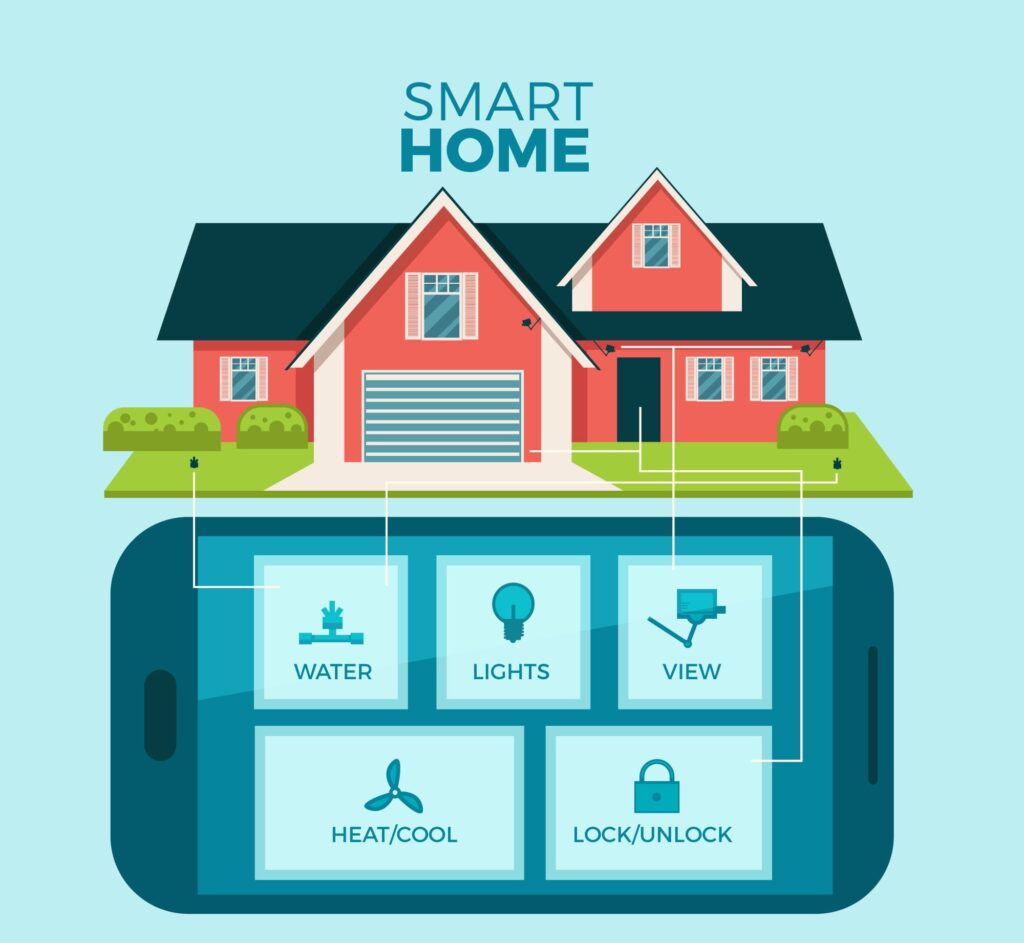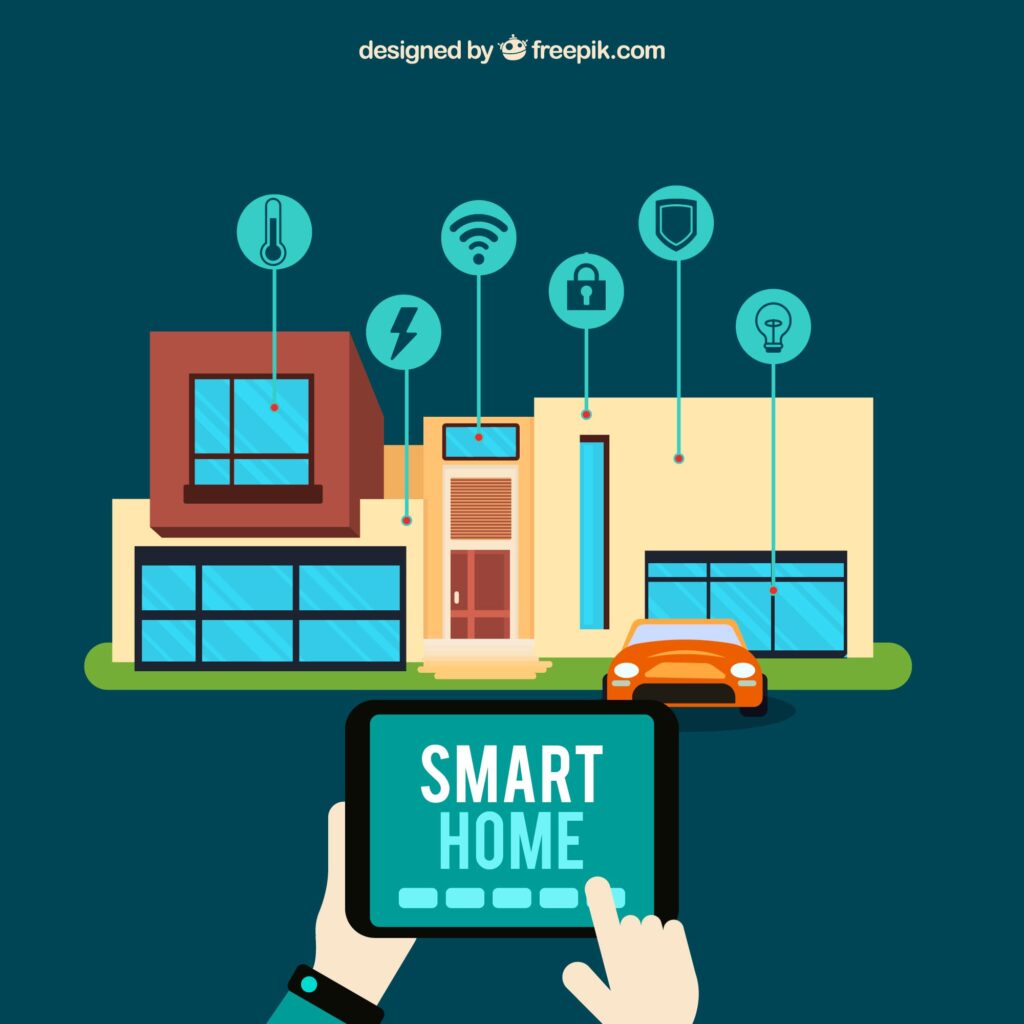The real estate industry has always been deeply intertwined with technological advancements, but in recent years, one development has taken center stage—smart home technology. As homes become increasingly connected, buyers and investors are looking for properties that offer convenience, customization, and advanced features that make everyday living easier. From automated lighting and thermostats to voice-controlled security systems, smart home technology is shaping the future of real estate in ways that are hard to ignore.
What is a Smart Home?
A smart home is a residence equipped with internet-connected devices that allow homeowners to control various elements of the home environment through a single interface, often from a smartphone or tablet. This includes systems like:

- Security Cameras: Allowing homeowners to monitor their property remotely, offering peace of mind and increased safety.
- Thermostats: Smart thermostats learn homeowners’ habits and automatically adjust the temperature to save energy without sacrificing comfort.
- Lighting: Automated lighting systems that can be controlled remotely or set to follow schedules, improving both convenience and security.
- Door Locks: Smart locks offer the ability to lock or unlock doors from anywhere, track who enters or exits, and even grant temporary access to guests.
By connecting these devices through a centralized platform, smart homes provide flexibility, enhanced convenience, and greater control over day-to-day living. As more consumers adopt these technologies, the real estate market is being forced to adapt, making smart homes a key selling point for modern buyers.
How Technology is Changing the Real Estate Landscape
Technology has already revolutionized how we buy and sell homes. Virtual tours, 3D renderings, and online listings allow prospective buyers to view properties from the comfort of their current home. Additionally, advancements in machine learning and digital marketing have empowered real estate agents and developers to predict market trends, better understand buyer preferences, and target the right audience with pinpoint accuracy.
Virtual tours give buyers a sense of what it’s like to walk through a home without having to set foot inside. Machine learning helps in predicting property values, investment opportunities, and neighborhood growth, making smarter decisions about which properties will hold value over time. Digital marketing allows agents to promote properties to a global audience, attracting tech-savvy buyers who prioritize smart home features.
Impact of Smart Home Technology in Real Estate

The integration of smart home technology is creating a ripple effect across the real estate industry. Here are some of the ways it is making an impact:
- Automation: The ability to automate everyday tasks such as adjusting thermostats, controlling lights, or setting security systems makes a home more appealing. This automation adds an element of luxury and ease to the homeowner’s life.
- Remote Monitoring: Smart home devices allow for remote monitoring, giving homeowners peace of mind by allowing them to check on their property from anywhere in the world. This is a particularly attractive feature for vacation home buyers or frequent travelers.
- Programming and Customization: Smart home devices allow users to set schedules, routines, and behaviors that match their daily lives. Whether it’s adjusting lighting based on the time of day or programming the thermostat to conserve energy, these options allow for a highly customized living experience.
- Ease of Use: The convenience of controlling all home systems from one device or via voice commands makes smart home technology user-friendly, increasing its appeal to a broad range of buyers.
Technology is not only making homes more livable but also a critical factor for investors and homeowners looking to maximize property value and make informed real estate decisions.
The Benefits of Owning a Smart Home
For homeowners and potential buyers, smart home technology offers several distinct benefits:
- Voice Commands: The ability to control various home systems using voice commands (e.g., via Google Home or Amazon Alexa) adds a new level of convenience. From adjusting the thermostat to locking the doors, simple voice commands can handle multiple tasks.
- Automated Security Systems: Advanced security features, such as motion sensors, facial recognition cameras, and automated door locks, provide enhanced safety and are accessible from anywhere in the world through mobile apps.
- Energy Efficiency: Smart thermostats and lighting systems can significantly reduce energy consumption by automatically adjusting to your daily routine, making homes more eco-friendly and cost-effective in the long run.
- Enhanced Security: Smart locks, cameras, and alarm systems allow homeowners to monitor and control their home security remotely, improving both physical safety and peace of mind.
Why Smart Home Technology is Increasing Property Value
The growing demand for smart home technology is driving up property values. Here’s why:
- Increased Property Value: Homes equipped with smart technology often command higher resale values. The convenience and energy efficiency that smart devices provide are seen as premium features that can increase a home’s overall value.
- Higher Demand: Modern buyers are looking for homes that are not just well-built but also equipped with the latest technology. Smart homes stand out in the market, attracting more interest from tech-savvy buyers.
- Premium Pricing: Because smart home features provide added convenience, energy savings, and security, properties with these technologies can often be sold at a premium compared to non-smart homes.
- Customization and Personalization: Smart home technology allows homeowners to tailor their environment to their specific needs and preferences. Whether it’s setting mood lighting for a dinner party or programming your HVAC system to adjust based on time of day, the ability to customize experiences adds value.
- Tailored Experiences: Buyers are increasingly looking for homes that offer a tailored living experience. Smart home features allow them to program and control their living environment in ways that fit their unique needs.
- Future-Proofing: Smart home technology is continually evolving, and homes equipped with these features are better positioned to remain relevant as new advancements are made. Future-proofing a property ensures it will continue to appeal to buyers and maintain its value over time.
The Future of Smart Homes in Real Estate
As smart home technology continues to evolve, it’s clear that it will play an even bigger role in the real estate industry. Homes that offer greater customization, automation, and energy efficiency will remain in high demand. For real estate developers, incorporating smart technology into new builds is no longer a luxury but a necessity to remain competitive in today’s market.
For homeowners, the benefits of owning a smart home go far beyond convenience—it’s an investment in the future. Smart technology not only increases the comfort and safety of living spaces but also enhances property value, making it a smart choice for today’s buyer.
In conclusion, smart home technology is shaping the future of real estate by offering innovative ways to automate and control various aspects of daily living. As the demand for these tech-enhanced homes grows, real estate developers and homeowners alike will need to embrace this trend to remain competitive and meet the needs of the modern buyer.


